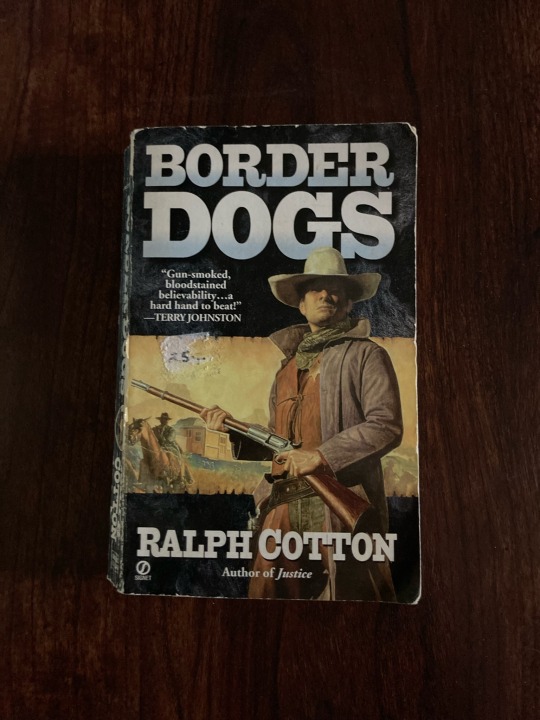#Western genre
Text
What is the Western genre?
Learn about the What is Western genre?: its history, features, themes, and examples in books, movies, TV shows, and more.
Western is a type of story that happens in the American West, usually between 1850 and 1900. It shows the lives of cowboys, settlers, outlaws, Native Americans, and lawmen who explored, fought, and settled the frontier.
Westerns are very popular and lasting stories in books,…

View On WordPress
0 notes
Text

Weapons and Physiognomy of the Grizzly Bear, George Catlin, 1846-48
#art#art history#George Catlin#genre painting#genre art#animal study#bears#grizzly bear#animals in art#American art#Western art#19th century art#oil on canvas#Smithsonian American Art Museum
2K notes
·
View notes
Text

#just finished an unbelievably good genre defying yet not medium defying debut novel and I want to understand it better#next should I read the literal Bible or the. thing. that’s even longer than the literal Bible?#should i go for the foundation of western culture or the foundation of internet culture?#op#tlt#tlt memes
4K notes
·
View notes
Text
Lies My TV Taught Me
Lies My TV Taught Me #Blog #Blogger #Blogging #TVWesterns #WesternMovies #DimeNovels #WildWestShows #BuffaloeBill #WilliamCody #AmericanHistory #AmericanWest #TVCowboys #MovieCowboys #GoodGuyWithAGun #History
“The Wild West didn’t have much in the way of forensics; when you saw the bullet hole you’d say, ‘That’s prob’ly what kilt ‘im’.” ― P.K. Vandcast
My recent trip to Texas got me chasing a pig trail looking for a “Western” rabbit hole.
I am from a generation that learned Wild West history on the “Silver Screen”, both the large one and the smaller one. Many of the producers of Wild West movies and…

View On WordPress
#Blog#Blogger#Blogging#Dime Novels#False History#Good guy with the gun#Gunfights#history#Movie Westerns#Political Statements#The West#TV Westerns#Western Genre#Wild West Show
0 notes
Text
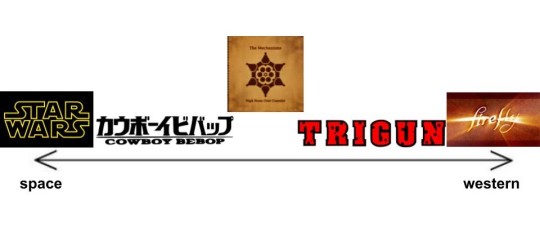
I've come to some conclusions about where space westerns fall when it comes to "more space" and "more western"
#star wars#cowboy bebop#high noon over camelot#trigun#firefly#I love space westerns <3 my favorite genre <3#hnoc is the perfect space western in my taste bc it is the perfect medium#between space and western#I could see cowboy bebop and trigun getting scooched around#but star wars and firefly are definitely the end poles#this is just my silly little takes
615 notes
·
View notes
Text
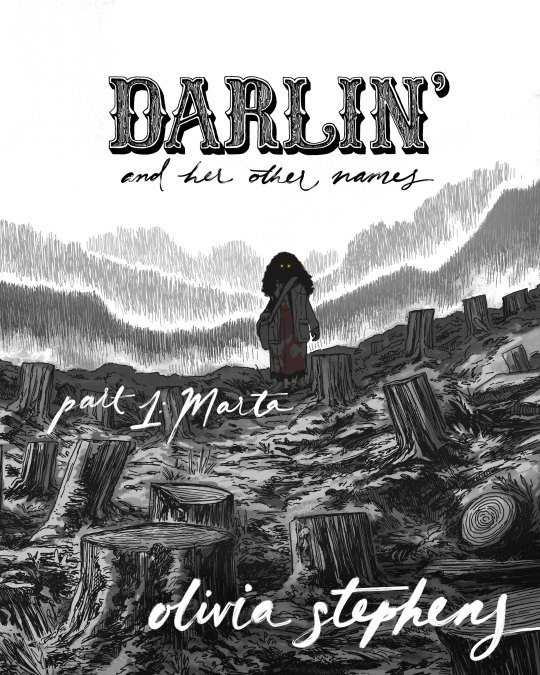
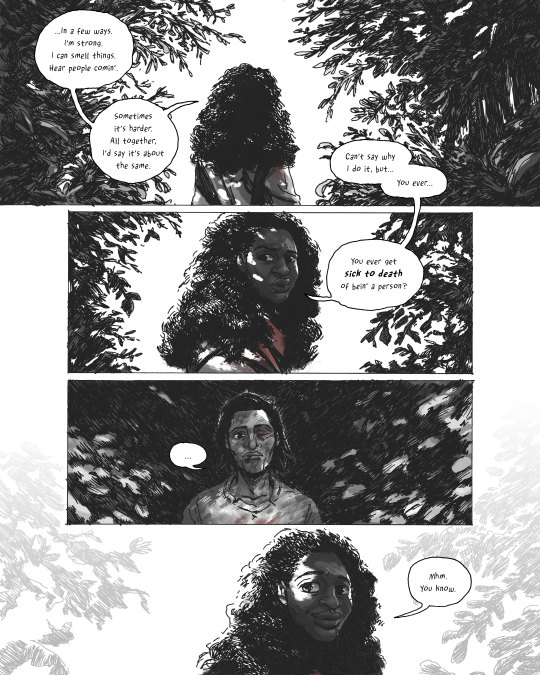
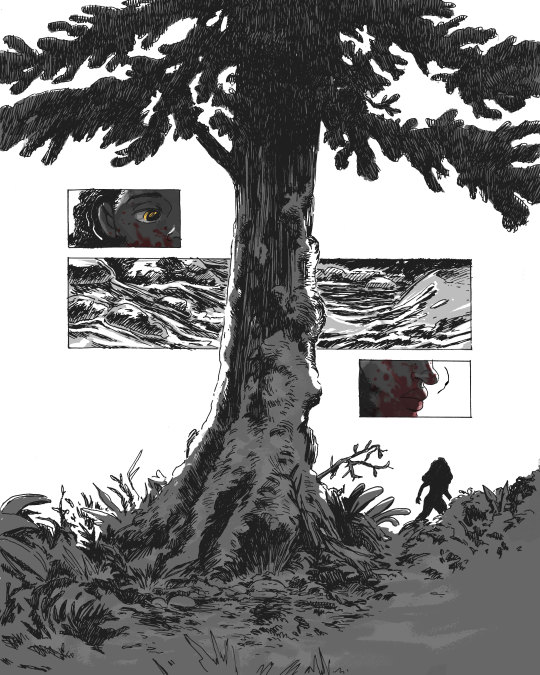

DARLIN’ AND HER OTHER NAMES, PART 1: MARTA
The first installment of my new werewolf-western-horror-romance comic is available now on gumroad and itch.io!
www.darlincomic.com
90 pages, mature readers only.
DARLIN’ is intended for mature audiences. This comic contains elements which some readers may find distressing, including:
murder, gun violence, animal cruelty and animal death, blood, gore, body injury/horror, nudity, and language.
Please proceed mindfully.
Title designs by Binglin Hu.
(Thank you to friends, family, patrons and readers for your patience and support during the making of Part 1!
I also want to give my immense thanks to Tin House, Mineral School Artist Residency, Artist Trust and MacDowell for providing time, space and support during various stages of Part 1’s progress. It means the world to receive validation for this weird little self-published project.)
#darlin' and her other names#darlin#comics#graphic novel#indie#self publishing#comic#werewolf#werewolves#cryptid#horror#western#romance#genre fiction#webcomic#indie comics
1K notes
·
View notes
Text
The History of Cyberpunk
Or why every other SciFi Genre is called [something]punk
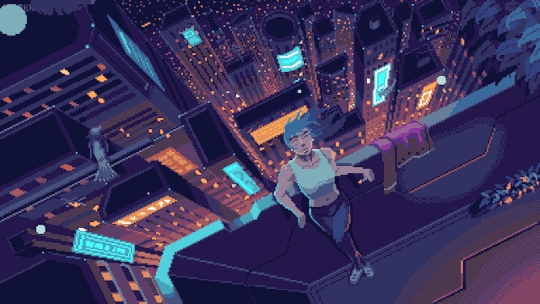
You know what? Let's do this. Because I have seen the discussion on whether or not Solarpunk is "punk" over the last few days and... people really gotta learn their history.
The first time a genre took the "punk" name was Cyberpunk. And for context we gotta talk a bit about the history of the Cyberpunk genre.
While some books that we in hindsight call "Cyberpunk" were released as early as the 1960s, the start of Cyberpunk as a genre got its start in the late 70s and early 80s.
The term was invented by Bruce Bethke, who published a short story in 1983 with the name "Cyberpunk". His idea was to juxtapose the term "punk" for both the mentality and the punk protagonists in his short story with the term cyber, short for the cybernetics they were wearing. And while the cybernetics have become a main stay in the genre, the punk attitudes are not always carried through...
Well, the title Bethke invented stuck, though. When 1984 Neuromancer was published, one of the most influencial works in the early days of the genre, he called it "a Cyberpunk novel" in the marketing. And from there... Well, the genre was suddenly named like that.
The 80s were definitely the decade that had the most influence on the genre, given that a lot of the big novels and graphic novels of the genre were released here.
A big influence was, no doubt, that 1982 the Blade Runner movie had released and had inspired quite a few writers and artists. (And yes, this makes Blade Runner a movie that released not only before the term Cyberpunk was coined, but also before the genre had a chance to define itself.)
Given that the genre was defined in the 80s, there are a lot of 80s anxiety kept within it about the rise of the Japanese economy, that are these days rarely questioned within the western Cyberpunk movement.
When the genre was coined and developed, Japan was the fastest growing economy in the world, being so influencial that they got to buy out several things in America. Something that kinda jerked white people in the US a lot. This is, why Cyberpunk originally depicted not only a capitalist hellscape - but specifically a capitalist hellscape were everything was bought out by Japanese companies, with many of those early antagonists being Japanese companies. And yeah... there was a lot of both anti-japanese racism, but also cultural appropriation of Japanese things in early Cyberpunk, at time surviving to this day. (But that is a story for another day.)
The general sense that Western Cyberpunk had, was always the idea of: We have a capitalist hellscape where the world is slowly dying and people are exploited with no end, while we have those kinda punky protagonists, who stand outside of the society and try to work against it. This being where the punk comes from.
Now, I could talk for length about how a lot of that punky attitude has been lost in more modern Cyberpunk media, but that, too, is a story for another day.
So, let me just talk about what happened then.
The term Cyberpunk really is darn catchy, right? So just when that name took hold, writer K.W. Jeter retroactively called his 1979 novel Morlock Night "steampunk". And guess what: This stuck, too. Though while the 80s Cyberpunk still stuck to the punk attitude, a lot of Steampunk did not. While for certain there is quite a bit of Steampunk that has kinda punky characters go against the quasi Victorian society of steampunk books (something most common in the air pirate novels I have read), a lot of other stories are more focused on a general sense of adventure.
But never the less... The genre names stuck and gave a nice baseline for naming other genre. We got Dieselpunk, Atompunk, Nanopunk, Arcanepunk, Dustpunk, Silkpunk and of course also Solarpunk and Lunarpunk.
And for the most part... The "punk" names mostly communicate: "It is SciFi with this kinda aesthetic/twist going on". Which is just how it turned out.
Funnily enough Solarpunk is for once a genre that brings back the punk, as it tends to include a lot of the ideals aspired to by the Punk counter culture of the 1970s: Anarchism, anti-capitalism, anti-consumerism, anti-classism, anti-racism, anti-colonialism and so on. Though other than with Cyberpunk and the real world punk movement, Solarpunk for the most part imagines a place, where those things are culture instead of counter culture.
I personally find it kinda sad, how for the most part Cyberpunk kinda lost a lot of the counter-cultural, revolutionary mindset. And how fucking defeatist the genre often is.
But again, it is a story for another day. Just as the story of Japanese Cyberpunk is.
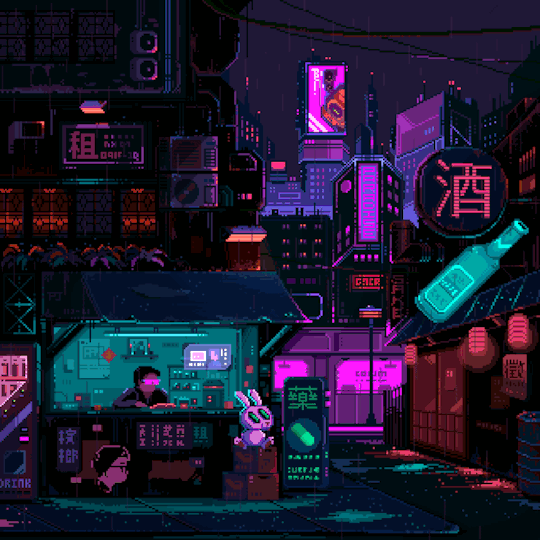
#cyberpunk#solarpunk#steampunk#cyberpunk history#western cyberpunk#science fiction#scifi#william gibson#neuromancer#genre history#punk
427 notes
·
View notes
Photo
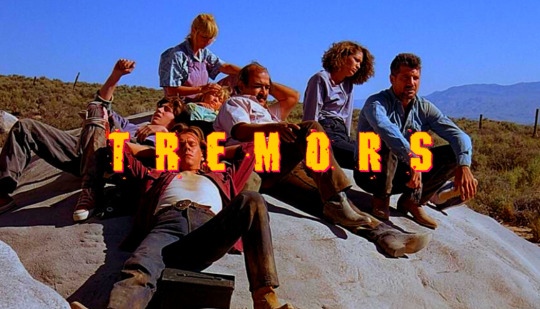
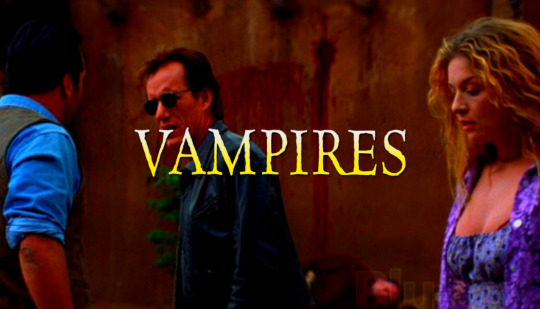
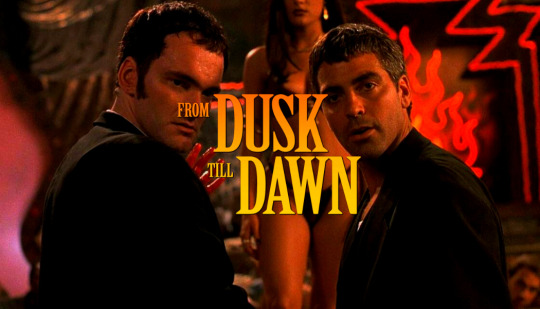
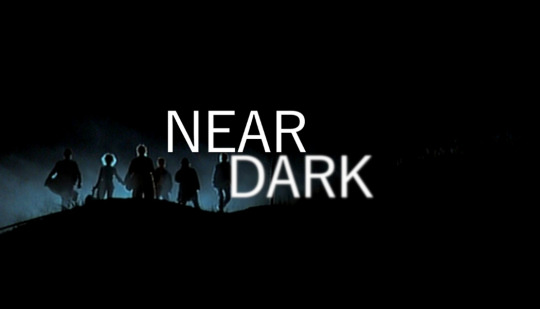

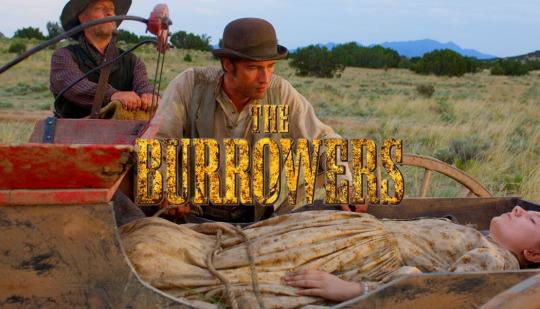

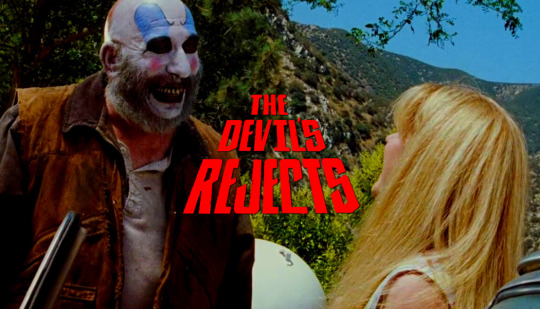

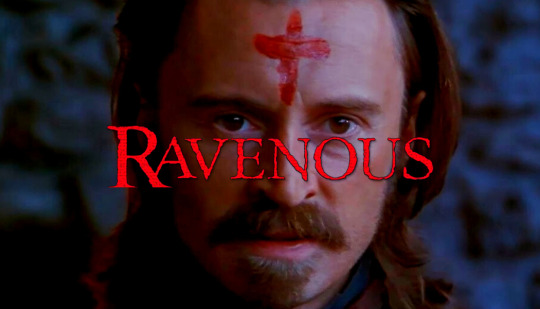
horror sub-genres • western horror
simply put, western horror is a mixture of horror and western. this genre is a combination of something called “weird westerns.”
#horror sub-genres#western horror#horror movies#horror#tremors#vampires#from dusk till dawn#near dark#brimstone#the borrowers#nope#the devil's rejects#bone tomahawk#ravenous#horroredit
1K notes
·
View notes
Text

Best genre
#western genre jotakak#look forward to more#cart00niart#jjba#art#jjba au#jojos bizarre adventure#kakyoin#jotaro
150 notes
·
View notes
Text
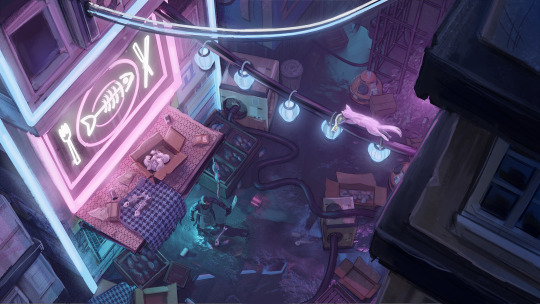
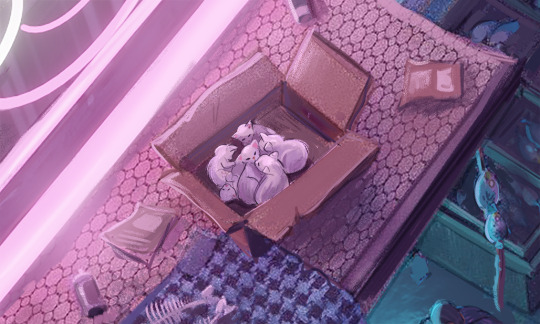

Got inspired by Stray, and painted a cat feeding her kittens <3. I may paint more of this little family in the future
#artists on tumblr#cats#stray#stray game#cyberpunk#kitties!!#i really think we need a version of Stray for every genre though#which may be another project i do in the future#like!!#we've got 'gritty cyberpunk but youre a cat'#what about#red dead redemption style western but youre a cat#steampunk mystery but youre a cat#possibilities are endless
422 notes
·
View notes
Text
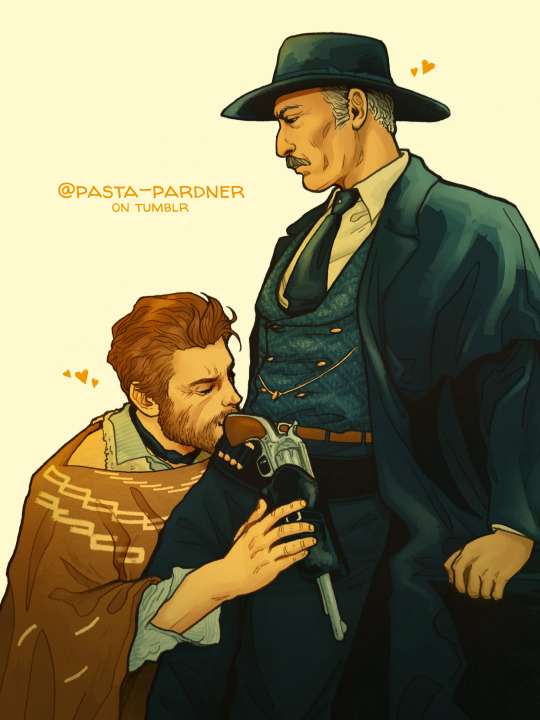
sixguns & innuendo
#mantimer#mancomer#tmwnn#douglas mortimer#manco#dollars trilogy#artner#theyre fully clothed but im adding the mature community label bc the phallic innuendo is . quite overt.#hhhhhh i've been thinking a lot lately about gun fetishism in westerns.#the scenes in fafdm where manco and mortimer handle each other's weapons already contain fair amounts of subtext#but i thought.. why not increase the homoeroticism !#sixguns are already practically treated as extensions of their gunslingers. why not let manco give mortimer's buntline a lil kiss? ;0#this was originally gonna be a two-part set with a companion image of mortimer returning the favor on manco's colt#(bc. u know. ''equal partnership'' and all that)#but i spent so much fucking time doing the rendering for this image that i decided to forgo the sequel. sorry + not sorry.#but !!! wow im so proud of the shading on this one. it took me an insane amount of time. please clap.#i might make a separate post later about western genre theory and cowboy gun eroticism but for now.... yehaw for phallic imagery !#for a few dollars more (1965)#westerns#🤠#🍝#art#pardner posts
422 notes
·
View notes
Text

John Scarlett Davis (British, 1804-1845)
The Interior of the British Institution Gallery, Detail, 1829
Yale Center for British Art
#John Scarlett Davis#british#genre painting#1800s#the interior of the british institution gallery#art#fine art#european art#classical art#europe#european#oil painting#fine arts#europa#island kingdom#england#gallery#studio#art studio#western civilization#british art
170 notes
·
View notes
Text
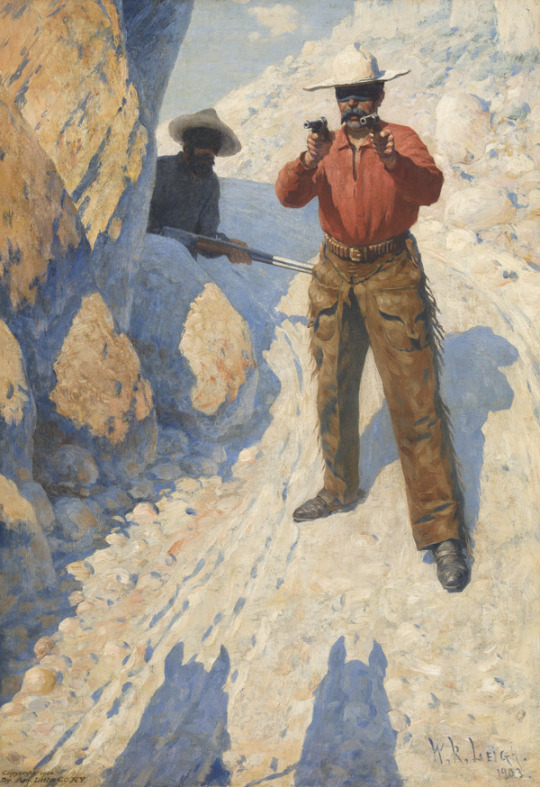
The Hold Up (The Ambush), William Robinson Leigh, 1903
#art#art history#William Robinson Leigh#genre painting#genre art#American West#Old West#Wild West#American art#Western art#20th century art#oil on canvas#Sid Richardson Museum
226 notes
·
View notes
Note
So fucking glad to see someone talk about SSS Class revival hunter 😭 I lived it so much and I feel like no one ever mentions it against more popular titles like ORV or even The Lout of the counts family, so I'm so glad to come here and see your amazing takes :>
Thank you for the ask which lets me talk about SSSCRH (the version I read was titled 'Suicide Hunter', which tbh I like more - no beating around the bush).
It's hard to draw an accurate comparison since I'm going off just the webtoon for SSSCRH, while I'm going off both the webtoon and the webnovel for ORV. And I love ORV, ORV is my media blorbo right now, it hydraulic presses my brain, I am writing ORV fanfic - it's, like, funner to enjoy. But SSSRH is just better. In the vast majority of ways it is is better. It's better than the holy trinity by a wide margin. TW talk of suicide obviously.
I can't believe I'm saying this but you need a basic understanding of Buddhism in order to understand SSSCRH. It's not about Gongja's suicides - he doesn't suicide from depression or lack of self-esteem. SSSCRH is about suffering in the Buddhist sense - dukkha. I don't want to make this an essay, so I might reblog this with more information, but extremely shortly:
The Four Noble Truths of Buddhism is the truth of suffering, the truth of the cause of suffering, the truth of the end of suffering, and the truth of the path that leads to the end of suffering. You've heard that Buddhists say 'life is suffering'. To put it one way that doesn't require defining a lot of words: the cause of suffering is experiencing the world as we percieve it instead of how it truly is. Suffering isn't just being miserable and in pain, and life isn't suffering because life sucks and global warming exists and people voted for Trump. Life is suffering because we can experience beautiful and joyful moments in this world, but we do not exist in the moment of that happiness or place our ego/'self' between us and that happiness. Living in that moment, accepting the moment as it is unconditionally, is freedom from suffering. The Buddha tries to free people from suffering through teaching Buddhism.
"What does this have to do with the webnovel and manwha about a guy murdering himself thousands of times" it has everything to do with it. Because SSSCRH is about suffering, and it is about using suffering as a tool in order to experience a world unfiltered by ego and break down the artificial boundaries between human beings. Suffering in SSSCRH is not a bad thing. Gongja has the unique capability to (reincarnate.) experience a person's suffering in unity with them, which dissolves the delusion of separation between people and puts us in touch with the reality of oneness.
The Murim arc was fucking insane because Gongja pulls a Big Bodhisattva Move and walks through the suffering of the world in order to achieve full understanding of the human experience. He takes all of the suffering of the world into himself and is liberated. You can tell it's Buddhist because death was not presented as a bad thing - death was an aspect of a happy ending for the Heavenly Demon lady, because she was finishing her life according to her own joy, and because her teachings were passed on she did not truly die.
But the purpose of embracing suffering is to discover the ability to fully embrace life, and that's where Heavenly Demon's teachings were incomplete - as the ghost dude said, Gongja hasn't even experienced his own full life and the infinite capability for his own happiness. You can only feel the depths of sadness when you've felt the depths of happiness. Sadness deserves its place in the world and it can strengthen you, but so does happiness.
Gongja is attention-seeking, envious, and unbelievably petty. When he drills down into his own desires and why he wants the things he wants, you see that he has a very strong sense of justice and right and wrong - he realizes he doesn't want to be famous, he wants to be acknowledged, but on an even deeper level he is desperate for love and to be loved. Everything he does is to experience love, and as such he learns to love others. His love for the Flamey Asshole was purely parasocial and ego-filled, with no concern for who he was as a human. Throughout the manwha, he grows to care for people as they truly are and pierce through any delusions or misleading outward appearances. He has released all attachment to life and death, and as such does not fear death, and as such has taken a step on the road towards becoming a Boddhisatva who frees others from the cycle of samsara, and as a result has learned sick sword techniques and is sooo good at beating people up.
I think the only other thing I want to mention here because otherwise this is an essay: in almost every time loop/regression story, only the final regression matters. In stories with dungeon monsters and NPCs, only the humans matter. The regressor exists in a space where there are no consequences for their actions, so they act terribly and do whatever because none of it matters. In Groundhog Day Bill Murray acts like an asshole because he can. That's not the case here. Everything Gongja does matters. The NPCs are fake, but Gongja never treats them as anything less than real people who deserve life. Once he understands a person's life he never treats them as unimportant. No loop is thrown away and no person or life is disregarded. His choices matter, the way he treats others matters, and Gongja never treats anybody as if they don't matter except for himself.
That was not short. There is a lot more. The female characters are so good and so rich. From a craft perspective it is excellently paced and has a wonderful sense of set-up/payoff and balances tone and maintains a lot of momentum, which is really hard in a time loop story. You have to do a few very specific things to write OP characters well and SSSCRH does it very well. There's more to say from a craft perspective and it's hard to judge accurately from a webtoon but it's good. I was so strangely struck the entire time about how sincere and genuine it was, how it said what it said with no trace of irony of confusion, and I think that's what stuck with me the most.
TL;DR: SSS Class Revival Hunter is good for a lot of very normal reasons, such as excellent pacing and set-up/pay off and characters, but it's also so sincerely and genuinely Buddhist that it blew my tits clean off.
#sss class revival hunter#kim gongja#ssscrh#I s2g I rewrite these like three times to be as short as possible#I just knew I had to define some terms because if I say 'it's about suffering' and leave it at that#people aren't going to fully get it#its not intuitive from a western perspective#It's really hard to get the full meaning of SSSCRH if you have no familiarity with Buddhism#bc suffering (and delusion and nothingness and oneness) mean diff things in buddhism than in english#theres other buddhist stuff like responsibility to the whole and the community but this was long enough already#the few ppl talking about it have good takes but I think ppl miss how#kgj isnt depressed and he doesnt kill himself from self-sacrifice#he's not kdj or cale#he only truly commits suicide (throws his life away) once which was from part percieved worthlessness of his own life#and big part EXTREME FUCKING PETTINESS NEXT LVL PETTINESS INSANE PETTINESS#every other time he kills himself is from his EXTREME goal oriented behavior#as usual there seems to be a dialogue with the rest of its genre#specifically the extreme egocentrism and selfishness of its genre and other OP protags#(which cale has a hilarious relationship w/)#(ur doing amazing honey i know this upsets you)#my asks#and theres also a conversation with buddhism itself anyway#i love orv but this is so much better on so many levels and its being slept on smh#nobody is going to read this its way too long but you know. its not ABOUT you.
154 notes
·
View notes
Text

The snowman
By Jan Walraven
#art#painting#fine art#classical art#dutch art#dutch artist#dutch painter#19th century art#19th century#children#winter#oil painting#european art#western art#genre painting
97 notes
·
View notes
